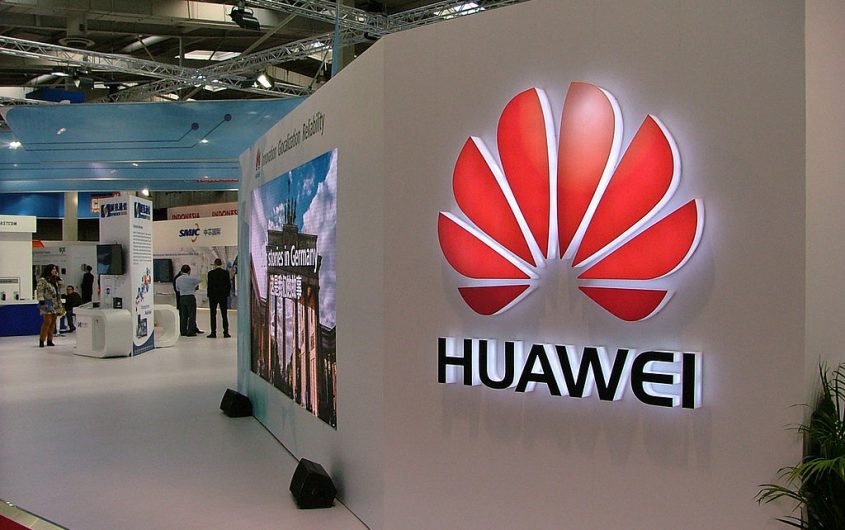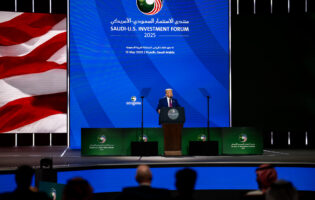
Olaf Kosinsky/Skillshare.eu via Wikimedia Commons
Uprising Against German Chancellor in the Case of Huawei

Simon Schütz
German Association of the Automotive Industry (VDA)
Simon Schütz works as the head of communication for the German Association of the Automotive Industry (VDA) in Berlin. Before that, he was a Responsible Editor at BILD, covering U.S. politics as well as domestic politics in Germany. In addition, he freelanced for the American National Public Radio (NPR), where he wrote mostly about current developments in Germany.
Simon graduated from Freie Universität in Berlin, with an MA in strategic political communication. He also studied at George Washington University in Washington, DC, where he primarily focused on public diplomacy and campaigning during elections and in Bordeaux, France.
From the U.S. perspective, the situation is simple. The Trump administration banned the Chinese telecommunications company Huawei from the U.S. market—and made it pretty clear that it does not want the tech giant to have access to any of its allies’ markets. This idea came at a time when the next generation of wireless networks, known as 5G, is being planned and rolled out all over the world. For many countries—including Germany—the Chinese company’s equipment would play a major role when it comes to the speed of the fifth-generation data network installation. Banning Huawei would most likely cause a significant delay in its finalization.
When it comes to Huawei there is no doubt about the company being the world’s biggest telecommunications network equipment supplier. It currently operates in more than 170 countries and has signed more than 60 contracts for 5G with international carriers. Its global impact and influence is therefore indisputable.
The U.S. government made the point that it will stop intelligence sharing with Germany if it decides to work together with Huawei when putting up the 5G network.
The problem: Part of its rapid growth was made possible thanks to extensive aid from the Chinese government. To believe that Huawei is independent of Chinese leadership seems more than naive. It’s not for nothing that the U.S. suspects Huawei of installing bugging systems and spyware for the Communist Party. This is why the U.S. government made the point that it will stop intelligence sharing with Germany if it decides to work together with Huawei when putting up the 5G network. In addition to the sharp letter from Ambassador Richard Grenell, most recently U.S. Secretary of State Mike Pompeo again demanded the exclusion of Huawei during his visit to Berlin with the same argument: Huawei technology could be a gateway for espionage by China. In a recent conversation, Peter Rough, Policy Analyst at the Hudson Institute, stated that a German cooperation with Huawei “would be a huge setback in the relationship. However, Germany relies on the U.S. for a lot of intelligence and America will never deny Germany key intel that could save German lives. But in other areas where intelligence might leak to the Chinese, I’d expect some limits.” Rough also underlines the importance of this case: “5G is not one issue among many—it’s the backbone of our future society. To let an authoritarian, anti-Western state control the system on which our societies will run is unacceptable.”
Apparently, the German government is unconvinced for the moment. Federal Minister of Economics Peter Altmaier once again rejected the U.S. exclusion of Huawei from establishing a 5G mobile network at a meeting this week. He emphasizes the tightened requirements for 5G expansion.
However, would a signature below a corresponding agreement matter? Very doubtful! Unquestionably, the Chinese state has the means to access company data, as the German intelligence agency, the BND, has specifically warned. Identifying and barring possible backdoors in Huawei technology is impossible, even if the company discloses its source code to the German authorities.
Although Merkel and the German government seem to have a clear standpoint toward Huawei, this position is not uniformly shared within the governing parties. The best example of this is Norbert Röttgen, chairman of the Bundestag’s Foreign Affairs Committee and something of a spokesman for the resistance to Huawei. In his words, the technological power that China has thanks to companies like Huawei is like “having a nuclear bomb.” He does not refer to the possible devastation caused by its use, but is rather referencing the threat scenario: the possibility that the Chinese could “turn off Germany.”
There are a couple of motions that call on the upcoming CDU party congress to exclude Huawei from 5G mobile communications. So far, however, Merkel has remained stubborn.
He is not alone in this point of view. There are a couple of motions that call on the upcoming CDU party congress to exclude Huawei from 5G mobile communications. So far, however, Merkel has remained stubborn. “Of course, I take all discussion contributions seriously,” Merkel recently said. “But after careful consideration, we decided in the Federal Government to stick to the standards and trust our security authorities here.” Controversially, even if the CDU was to vote for an exclusion for Huawei later this week, Merkel would pursue her plans despite all security concerns.
And it is not only her own party that is growing more resistant to Merkel’s position on this issue. A group of digital, economic, and foreign policy experts—all members of the German parliament from Merkel’s coalition partner, the SPD—now call for the exclusion of Huawei in a position paper. The document states: “Digital sovereignty means the ability to control the cyberspace in the European Union […] This also implies the ability to prevent the access of non-European powers to the critical infrastructure now and in the future.” They argue that, “When expanding the 5G network, untrustworthy manufacturers—especially if unlawful influence, manipulation or espionage cannot be ruled out—should be excluded in principle.”
This all shows that it is not only the U.S. and its government pushing Merkel to exclude Huawei from 5G expansion in Germany. Her position is being increasingly attacked by her own party as well as by her coalition partner. The remaining question is: Will she yield, or will she stay on a collision course?









